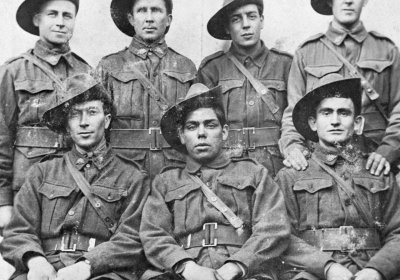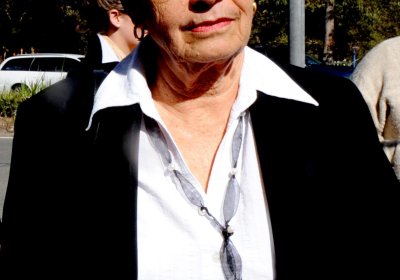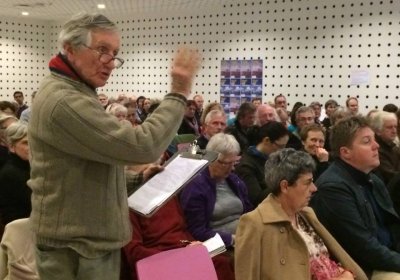One in three women is a victim of domestic violence. I am one of those.
The violence did not happen until I was pregnant and, as a result, vulnerable. I did not report it to the police as I was too scared: it was carried out in the privacy of our flat; there was no obvious injury and he was very contrite afterwards.
I vividly remember him buying me breakfast at a cafe the next morning, an unusual event, while I sat too traumatised and depressed to say anything. Before that, I had never suffered a physical assault from anyone.
Coral Wynter
We have been assaulted by a massive celebration of 100 years since the landing at Gallipoli on April 25. This is partly due to the success of the protests at the 200th anniversary celebration of the January 26, 1788 First Fleet landing at Sydney Cove. There have been many protests on January 26 since then, undercutting and besmirching Australian nationalism.
I take issue with Ben Courtice’s and Emma Murphy’s criticism of my review of Bill Gammage’s book, The Biggest Estate on Earth: How Aborigines Made Australia in the January 28 Green Left Weekly.
I have two major arguments with their criticism. First, Gammage has made a major contribution to our understanding of how Aboriginal Australians cared for the land for more than 60,000 years right across the continent.
The huge multinational US oil corporation Texaco operated in Ecuador from 1964 until 1992 (Texaco merged with Chevron in 2001).
The corporation poured 72 billion litres of oil waste and 45 million litres of crude oil over 2 million hectares of land in Santa Elena province — land which included the Amazon rainforest, rivers and agricultural land.
Texaco just poured the oil into ground-connected pipes which just poured oil directly into the rivers and forests.
The Latin American Social Forum held a forum on February 7 in Sydney. About 80 people attended.
We were welcomed by the Ecuadorian indigenous folksinger Manuel with a ceremonial greeting in Quechua to Pachamama and soulful pipe playing. The evening began with a video conference with Pablo Fajardo, representing the 30,000 indigenous Ecuadorians fighting against the ecological disaster caused by Chevron-Texaco.
Chanting "Always was, always will be, Aboriginal land," more than 500 members of Aboriginal communities from across the country and their supporters marched from Civic in the centre of Canberra to the Aboriginal Tent Embassy in front of Old Parliament House on January 26, also known as Invasion Day.
The embassy was also the site of the second meeting of the Indigenous National Freedom Summit, following its founding in Alice Springs in November 2014.
Maralinga: The Chilling Expose of Our Secret Nuclear Shame & Betrayal of Our Troops & Country
By Frank Walker
Hachette, 2014
Frank Walker, who worked as a journalist for Australian and international publications for 38 years, was talking to his daughter's university friends one day and discovered they had no idea atomic bombs had been exploded in Australia.
In fact, 12 had ― excluding the 300-600 minor trials at Maralinga, Emu Field, both in the South Australian desert, and Monte Bello Islands off the Western Australian coast.
In the past five years the global bee population has been devastated. This matters because they are critical to the food chain, pollinating 70% of our food either directly or indirectly. Besides pollinating vegetables, fruits and nuts, they also pollinate the lucerne that feeds our cattle and cotton that makes our clothes.
The US lost 60% of its bee population in 2012 and then another 40% last year. The European wild honey bees have all but disappeared.
There has been a dramatic rise in the female prison population in Australia in the last 10 years. This increase is largely due to the rising number of Aboriginal women going to prison.
In 1996, about 21% of women in prison were Aboriginal, last year it was 33%. The rate of increase is much greater than that of men.
Australia has the dishonour of jailing the highest proportion of its Indigenous female population in the world. Aboriginal women are 17 times more likely to be incarcerated than non-Aboriginal women.
The Royal Commission into the Institutional Responses to Child Sexual Abuse has asked for another $104 million from the federal government to hold hearings until the end of 2017.
The commission has released an interim report, for which they held more than 1600 private sessions and received more than 1600 written accounts from survivors of sexual abuse.
Under intense lobbying by big electricity companies, the Tony Abbott government is attempting to scrap the Renewable Energy Target (RET) which aims to have 20% of Australia’s electricity come from renewable energy sources by 2020.
In response to this threat, a new community group called Solar Citizens is campaigning to defend existing solar power and extend solar to even more households. They have held public meetings in Brisbane, Adelaide, Sydney and Melbourne.
Australia is at risk of becoming a scientific backwater due to the federal government’s budget cuts to the CSIRO.
The government has proposed a $111 million cut to CSIRO funding in the May budget — about 20% of its total funding — and at least 1000 full-time staff will lose their jobs over the next four years.
Eight CSIRO sites around the country will close. Many are in regional country towns, which rely on the sites for employment.
- Previous page
- Page 10
- Next page











